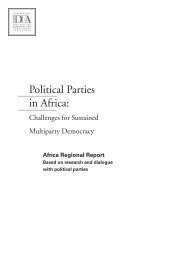Seminar Report The role of Political Parties in Democratic Transitions
Seminar Report The role of Political Parties in Democratic Transitions
Seminar Report The role of Political Parties in Democratic Transitions
Create successful ePaper yourself
Turn your PDF publications into a flip-book with our unique Google optimized e-Paper software.
Establish<strong>in</strong>g Multiparty Dialogues<br />
Multiparty dialogues have been essential <strong>in</strong> many countries to help build consensus and trust, promote<br />
reconciliation and solidify democratic transitions. While parties compete at elections they also need to<br />
work together. What pr<strong>in</strong>ciples do the parties share <strong>in</strong> common? What are essential to all parties to<br />
perform their democratic function?<br />
Negotiat<strong>in</strong>g Space for <strong>Democratic</strong> Politics<br />
<strong>The</strong> relationship between the state (government, army, <strong>in</strong>stitutions) and citizens and political actors is<br />
be<strong>in</strong>g fundamentally redef<strong>in</strong>ed <strong>in</strong> a democratic transition. Hence there is a need to def<strong>in</strong>e the <strong>role</strong> <strong>of</strong><br />
the army, <strong>of</strong> the state and <strong>of</strong> the citizens anew.<br />
<strong>Parties</strong> to respond to voters expectations both with regard to Representation and Delivery<br />
<strong>Political</strong> parties are ultimately vehicles to reflect the diversity <strong>of</strong> the country, to respond to voter<br />
expectations and help make life better for citizens <strong>in</strong> practical ways. It is not enough to make<br />
promises, People also want to see real improvements <strong>in</strong> their livelihoods and freedoms.<br />
<strong>The</strong> presentation was followed by a discussion where many questions and reflections were voiced.<br />
Participants wondered about: How the cooperation with local government could be improved <strong>in</strong> order to<br />
better deliver results for the communities? How other countries had ensured a level play<strong>in</strong>g field where<br />
there are two dom<strong>in</strong>ant parties? How conflicts can be resolved through dialogue? How to make parties<br />
more democratic with<strong>in</strong> their own structures?<br />
Mr Tom Cormier stressed that many <strong>of</strong> the issues also persists <strong>in</strong> other countries – not only Myanmar –<br />
and the search for better solutions cont<strong>in</strong>ues. In this respect, democracy always needs <strong>in</strong>vestment <strong>in</strong><br />
build<strong>in</strong>g your party, <strong>in</strong> hav<strong>in</strong>g dialogue also with your opponents, <strong>in</strong> def<strong>in</strong><strong>in</strong>g the <strong>role</strong> <strong>of</strong> the military, <strong>in</strong><br />
f<strong>in</strong>d<strong>in</strong>g development paths that will truly benefit <strong>in</strong> particular the rural areas.<br />
1.4. Summary Presentation on “Experiences and Inspiration from a successful transition to<br />
Democracy: the case <strong>of</strong> Indonesia”<br />
By Dr Ignas Kleden, Chairperson <strong>of</strong> the Kommunitas Indonesia untuk Demokrasi (KID)<br />
Discussant: Mr Aung Na<strong>in</strong>g Oo, Director, Vahu Development Institute<br />
In this presentation Dr Ignas Kleden described the transition or ‘rediscovery’ <strong>of</strong> democracy <strong>in</strong> Indonesia<br />
through different periods. He emphasized that <strong>in</strong> his view, dur<strong>in</strong>g Indonesia’s path to democracy there is<br />
so far no evidence that political parties have played a significant <strong>role</strong>. Only between 1950-1952, when<br />
Indonesia implemented liberal democracy, many parties were set up to demonstrate that democracy was<br />
develop<strong>in</strong>g and thriv<strong>in</strong>g. This was an <strong>in</strong>stable period, consensus was almost unreachable because <strong>of</strong><br />
fractions <strong>in</strong> parliament. <strong>The</strong>re were frequent changes <strong>of</strong> cab<strong>in</strong>ets and frequent and ris<strong>in</strong>g tensions<br />
between the president and the vice-president.<br />
Dr Ignas Kleden then outl<strong>in</strong>ed the developments dur<strong>in</strong>g the follow<strong>in</strong>g periods:<br />
Guided democracy period (1957-1965)<br />
<strong>The</strong> political parties had no power dur<strong>in</strong>g Soekarno’s rule. Dur<strong>in</strong>g this period there was no attention for<br />
economic policies, there was food shortage and <strong>in</strong>flation went up to 600%.<br />
New order period (1967-1998)<br />
After a period <strong>of</strong> military rule, Suharto was elected as president <strong>in</strong> 1967. Ma<strong>in</strong> features <strong>of</strong> the Sukarno<br />
period were: unbridled competition between political parties that led to <strong>in</strong>stability, neglect <strong>of</strong> economic<br />
affairs and the concentration <strong>of</strong> power <strong>in</strong> one hand. <strong>The</strong> party Golkar was established by the president<br />
as the sole active political party. <strong>Political</strong> opposition was <strong>of</strong>ficially ruled out because “conflict was<br />
contradictory to the Indonesian culture <strong>of</strong> harmony”. Media dur<strong>in</strong>g that time had “freedom with<br />
responsibility”, a concept never elaborated upon which made many journalists uncerta<strong>in</strong>.<br />
6
















